June 30, 2025

The article titled "7 Key Insights on Response Cost ABA for Effective Therapy" delves into the critical role and implications of response cost as a behavioral intervention within Applied Behavior Analysis (ABA) therapy.
Response cost stands out as an effective strategy for diminishing undesirable behaviors by removing valued items as consequences. This method not only showcases the potential for behavioral improvement but also underscores the necessity of ethical considerations and collaboration among therapists and caregivers.
Such cooperation is essential to guarantee positive outcomes and emotional well-being for individuals undergoing therapy.
Understanding the intricacies of Applied Behavior Analysis (ABA) therapy is essential for professionals aiming to foster positive behavioral changes. The demand for Board Certified Behavior Analysts (BCBAs) continues to rise, highlighting the importance of effective strategies in this field. Among various techniques, response cost ABA stands out as a pivotal approach that involves the removal of valued items as a consequence for undesirable behaviors. This article delves into seven key insights regarding response cost ABA, exploring its mechanisms, benefits, and ethical considerations. However, as practitioners navigate the complexities of this approach, they may wonder: how can they effectively balance the need for accountability with the emotional well-being of individuals in therapy?
The demand for (BCBAs) has skyrocketed, with an astonishing increase of 1,942% from 2010 to 2018. This surge is projected to continue, with a 25% rise expected by 2026. In this context, Hire ABA emerges as a vital recruitment platform, connecting BCBAs with premier job opportunities in the ever-growing field of Applied Behavior Analysis (ABA) therapy.
Hire ABA streamlines the hiring process, ensuring that qualified professionals find roles that align with their expertise and career aspirations. To enhance this experience, our platform offers personalized resume assessments. Candidates can submit their resumes for evaluation, where our team meticulously assesses their experience and career goals. We utilize advanced job fit scoring to identify opportunities that perfectly match their skills, preferences, and desired locations. This comprehensive support significantly boosts candidates' chances of securing desirable positions in a competitive job market.
The need for BCBAs is further underscored by the dramatic increase in job postings, which rose from 7,091 in 2017 to 16,109 in 2018—a remarkable 127% rise in demand. Additionally, the Bureau of Labor Statistics (BLS) projects an 8% job growth for BCBAs from 2020 to 2030, surpassing the average growth rate for all occupations.
With these trends in mind, consider how Hire ABA can meet your hiring needs. Are you ready to connect with top talent in this thriving sector? Let Hire ABA be your partner in navigating the evolving landscape of ABA therapy recruitment.
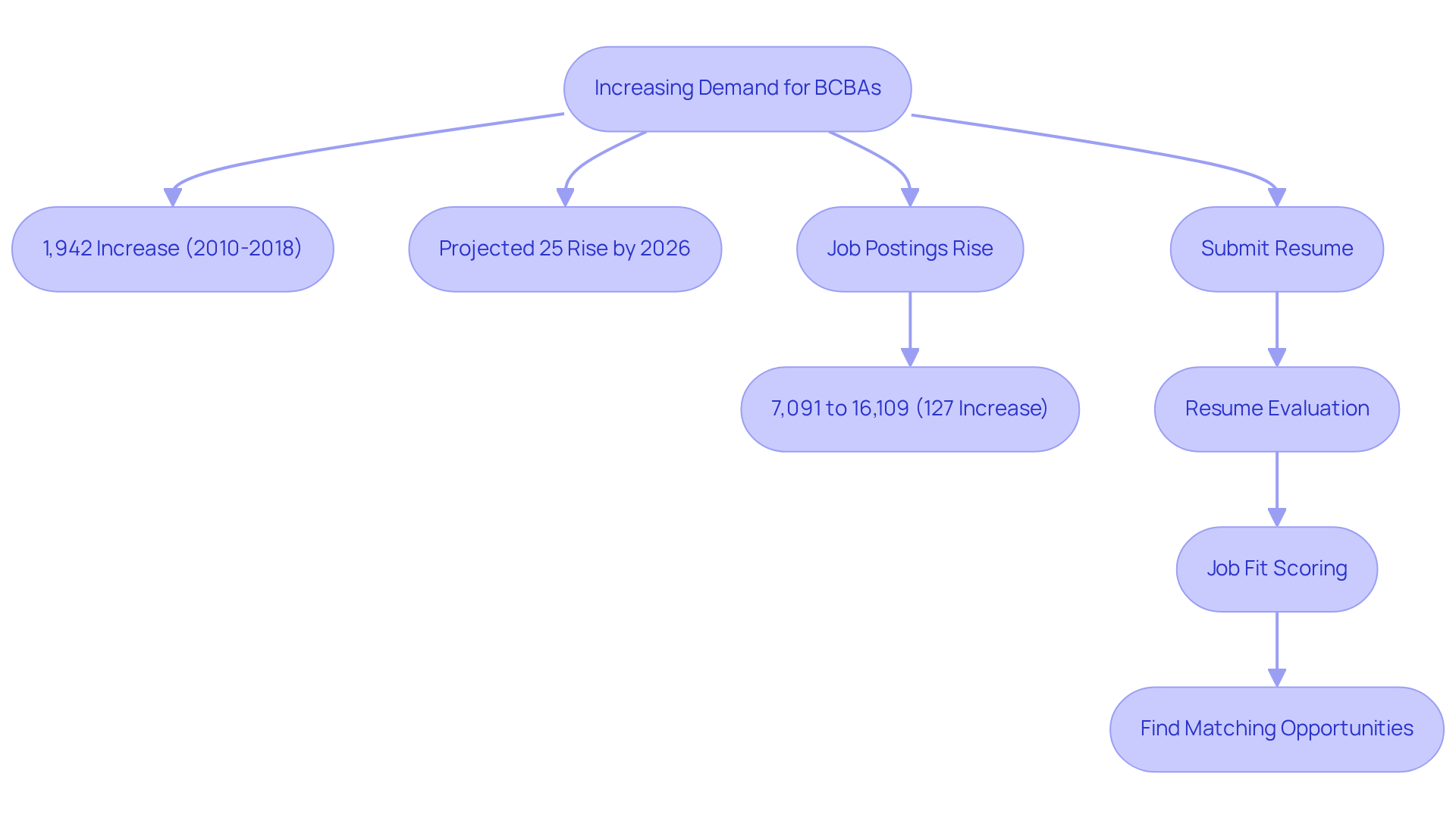
Response cost ABA is a behavioral intervention strategy utilized in Applied Behavior Analysis (ABA) therapy, involving the removal of a valued item or privilege as a consequence for unwanted actions. This approach is grounded in the principles of operant conditioning, aiming to diminish the frequency of undesirable behaviors by associating them with negative outcomes. Understanding response cost ABA is crucial for professionals, as it helps in developing that promote positive behavioral changes.
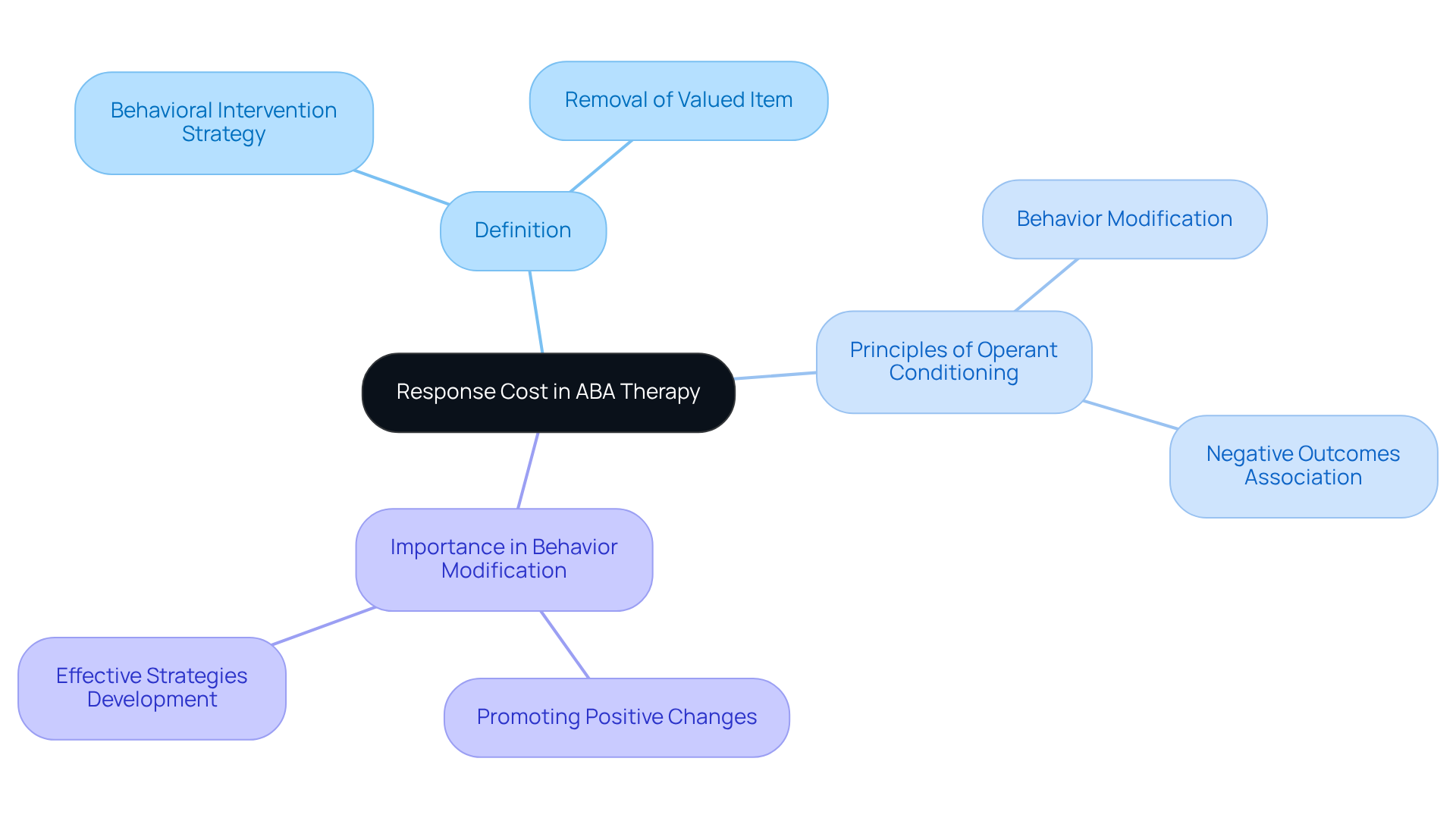
Response cost ABA effectively removes a previously obtained reinforcer when an unwanted action occurs. For example, if a child throws toys during playtime, a therapist may take away a preferred toy as a consequence. This immediate consequence helps individuals understand the connection between their behavior and the loss of a valued item. Successful consequence management requires:
However, it is essential to consider the ethical implications of response cost ABA, along with the potential emotional effects on individuals. Losing a reinforcer can lead to feelings of frustration or resentment, potentially impacting the therapeutic relationship. Therapists must to individual sensitivities and emotional reactions, ensuring that the approach remains compassionate and respectful. Furthermore, monitoring for possible negative effects or unforeseen outcomes is crucial to safeguard the welfare of individuals undergoing ABA therapy. By incorporating these considerations, therapists can foster a supportive environment that encourages positive behavior change while addressing the complexities of each person's experience.
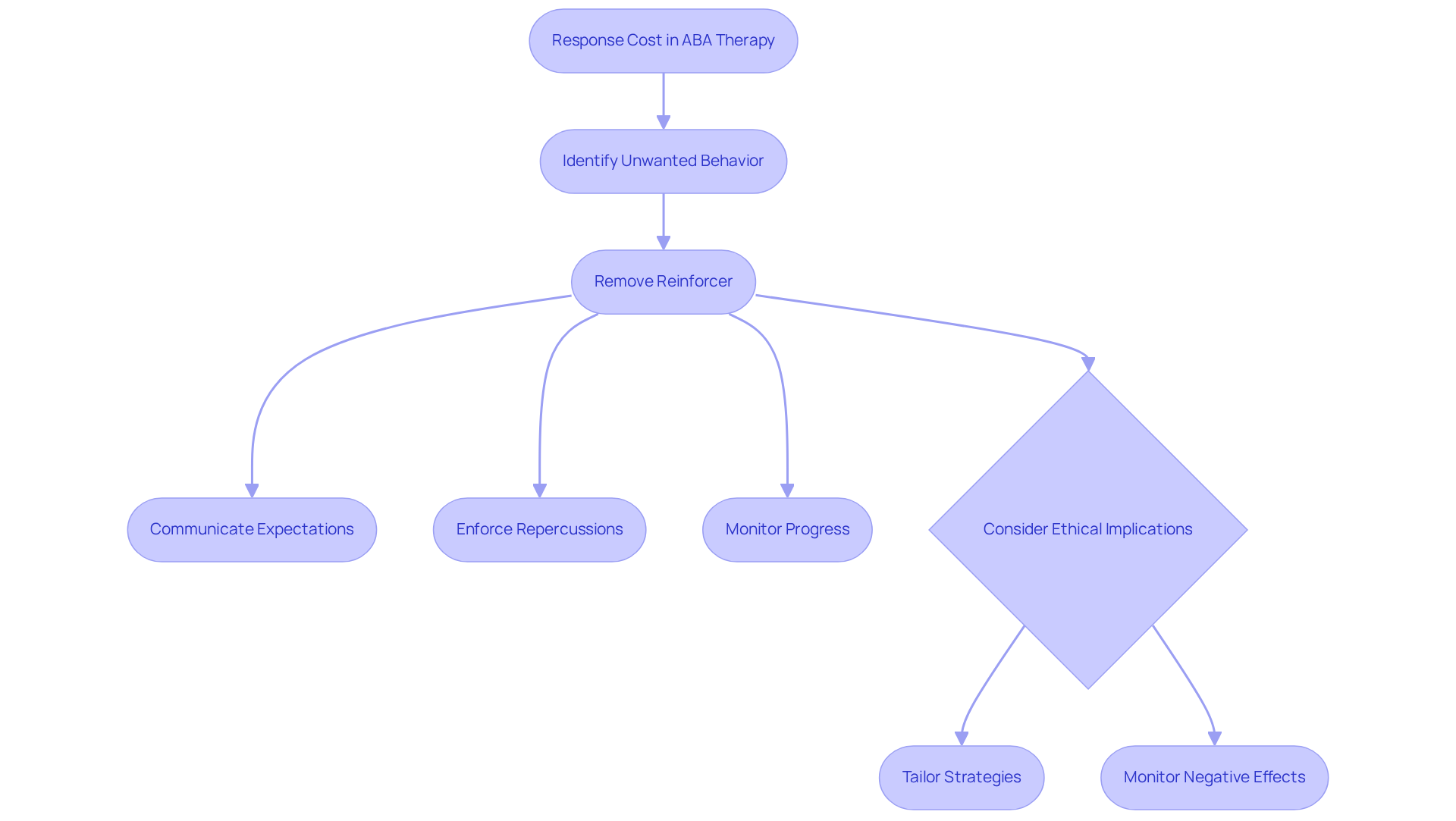
In the realm of cost management within ABA therapy, response cost ABA and ethical considerations are paramount. Practitioners must ensure that the removal of reinforcers is conducted fairly and reasonably, providing clear communication regarding the rules and consequences.
Have you considered the potential emotional distress or feelings of inadequacy that could arise from improper practices? Ongoing observation of the person's reaction is crucial; this ensures that interventions promote positive change without causing harm.
Cooperation among analysts, therapists, and caregivers is essential to guarantee a personalized and ethical application of response cost ABA strategies for consequence reduction. Striking a balance between effectiveness and ethical responsibility is vital for the success of ABA therapy. This balance not only enhances compliance but also safeguards the of those involved.
Furthermore, maintaining equilibrium between response effort and reinforcement is critical to prevent demotivation, ensuring that the intervention remains effective.
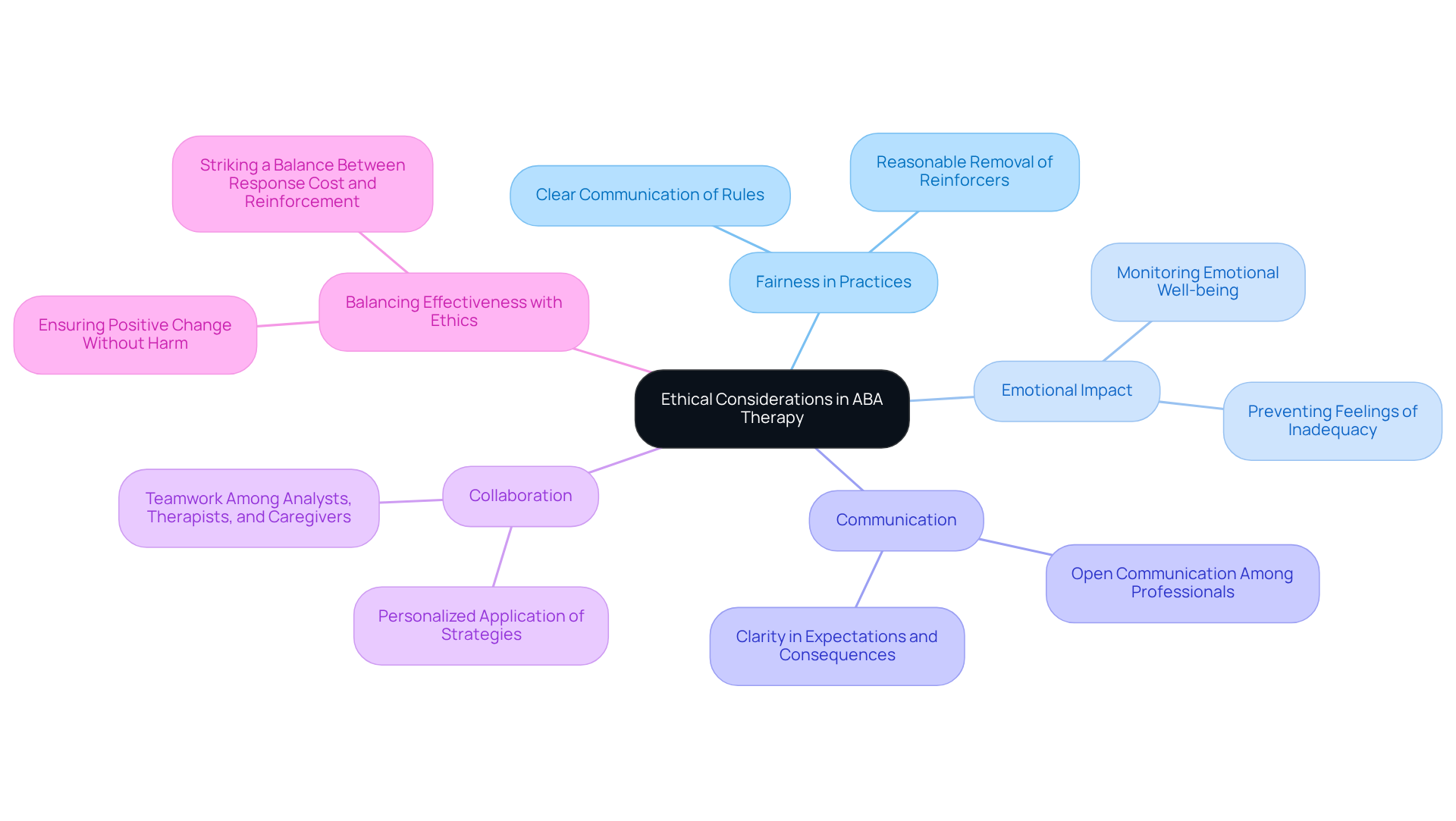
[Response cost ABA](https://hireaba.today) offers distinct advantages in modifying behaviors.
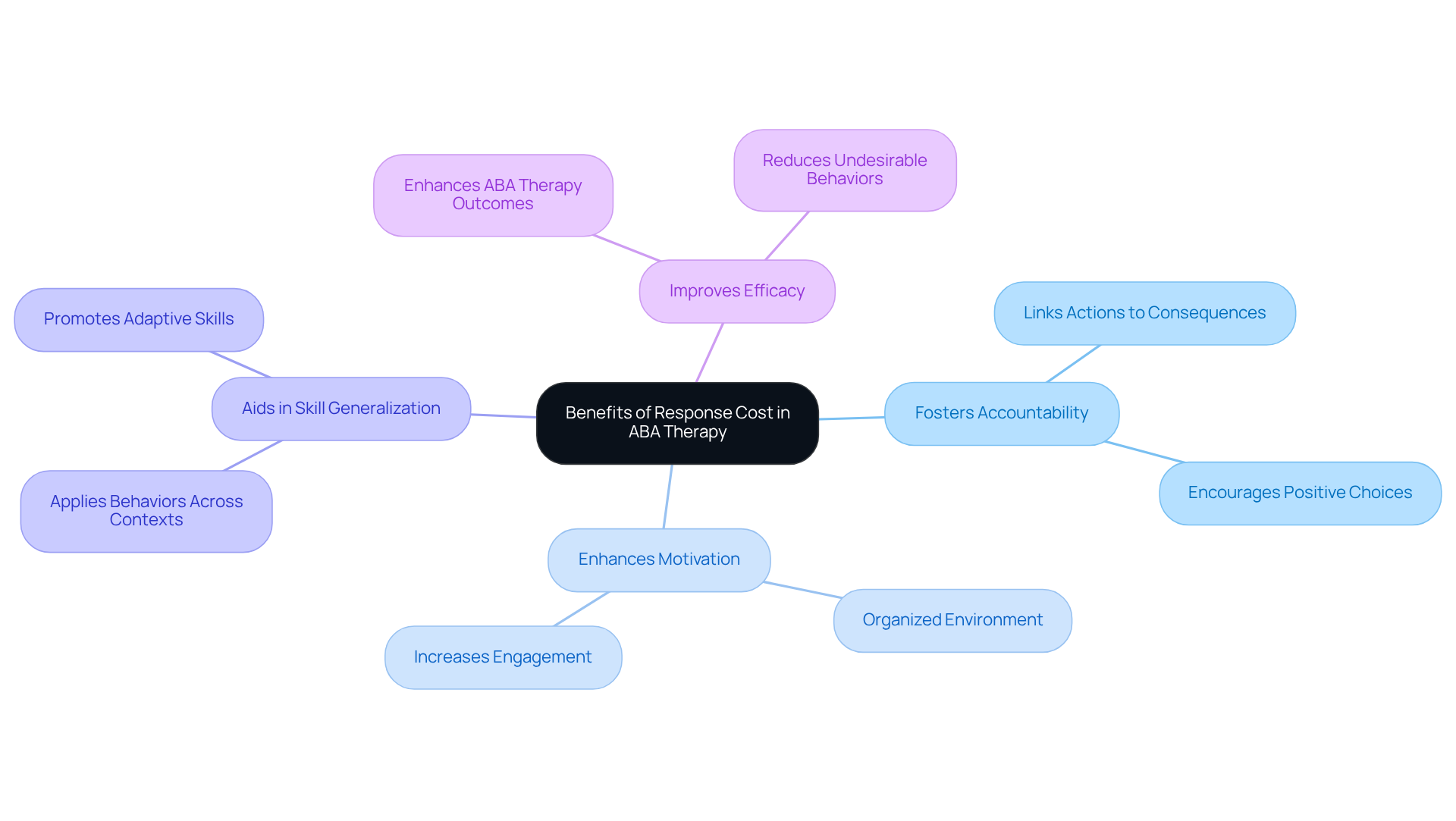
The demand for Board Certified Behavior Analysts (BCBAs) is projected to rise by 25% by 2026. This statistic underscores the urgency for in the field. While a useful modification technique, response cost aba presents several challenges that professionals must navigate. One significant risk involves the emotional turmoil individuals may experience when a cherished item is removed due to inappropriate actions. This can lead to frustration and resistance, ultimately undermining the therapeutic process.
Moreover, an excessive reliance on response cost aba without integrating positive reinforcement can exacerbate negative behaviors, such as avoidance or defiance. In fact, nearly 40% of therapists report significant difficulties in balancing this approach with positive reinforcement, highlighting the complexities of its implementation. It is crucial for practitioners to evaluate the appropriateness of response cost aba penalty fees on a case-by-case basis.
Ensuring that penalties are part of a comprehensive strategy that promotes positive behavioral change while minimizing emotional distress is essential for effective therapy. How are you currently addressing these challenges in your practice? Consider how Hire ABA can support your recruitment needs and enhance your therapeutic effectiveness.
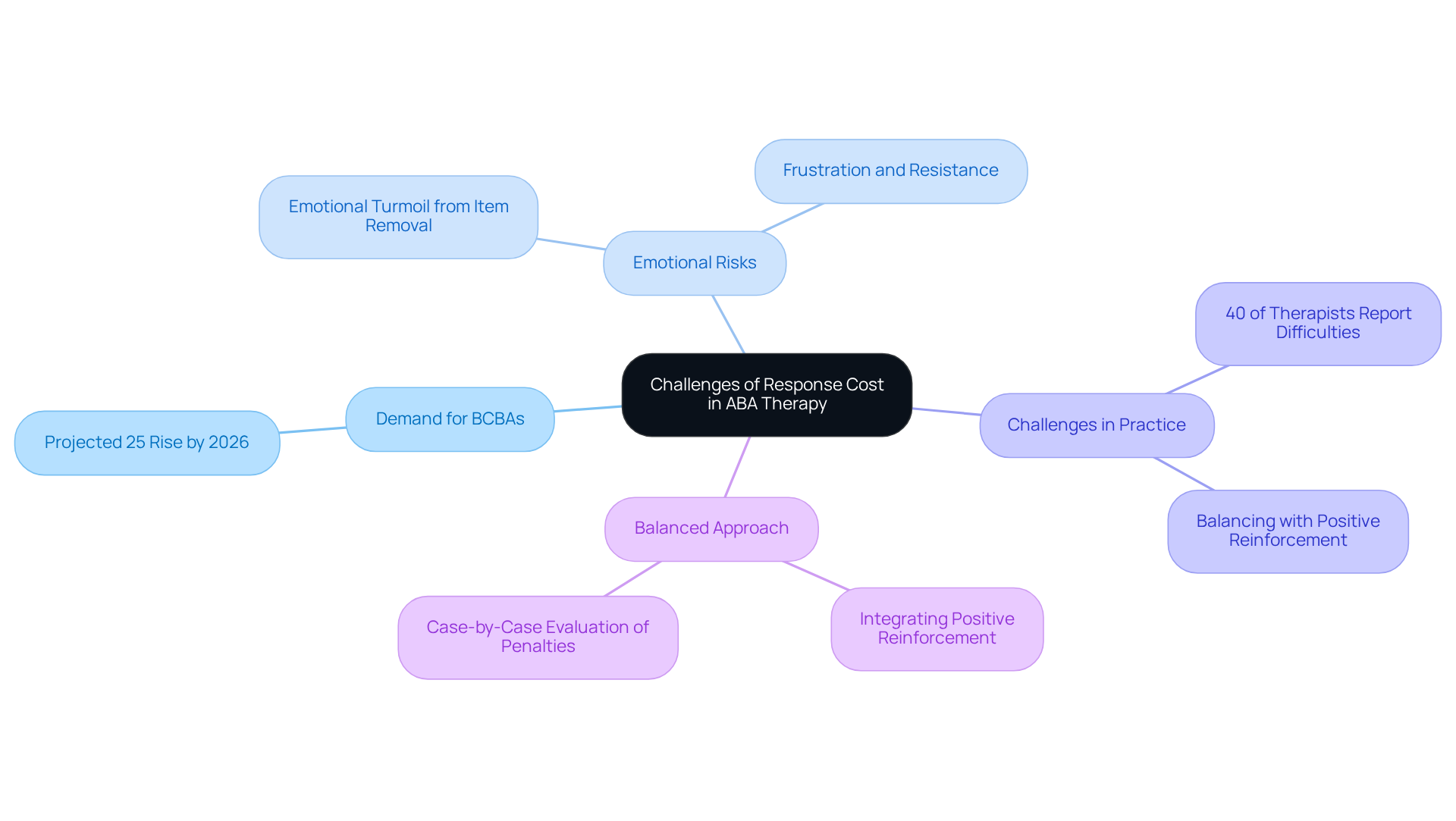
Cooperation among ABA therapists and caregivers is essential for the effective application of deduction strategies. Caregivers provide unique perspectives on a person's behavior and preferences, enabling therapists to tailor interventions that meet specific needs. Regular communication and feedback among all parties ensure that response cost ABA is applied consistently and effectively. Notably, research indicates that 90% of participants show significant progress when recommended hours of Applied Behavior Analysis therapy are fully implemented with active caregiver involvement. This underscores the critical in the therapeutic process.
This teamwork not only enhances the overall effectiveness of ABA therapy but also fosters a supportive environment that encourages positive behavior change. Case studies, such as 'The Role of Caregiver Education in Supporting Autism,' demonstrate that caregiver education, combined with positive affirmations, significantly improves behavioral outcomes and strengthens the caregiver's ability to support their child's development. Furthermore, statistics reveal that 74% of autistic students graduate with a diploma, compared to 86% of their non-autistic peers, highlighting the critical role of caregiver support in achieving educational success.
By collaborating effectively, therapists and caregivers can cultivate a supportive environment that benefits both the individual receiving therapy and the family as a whole.
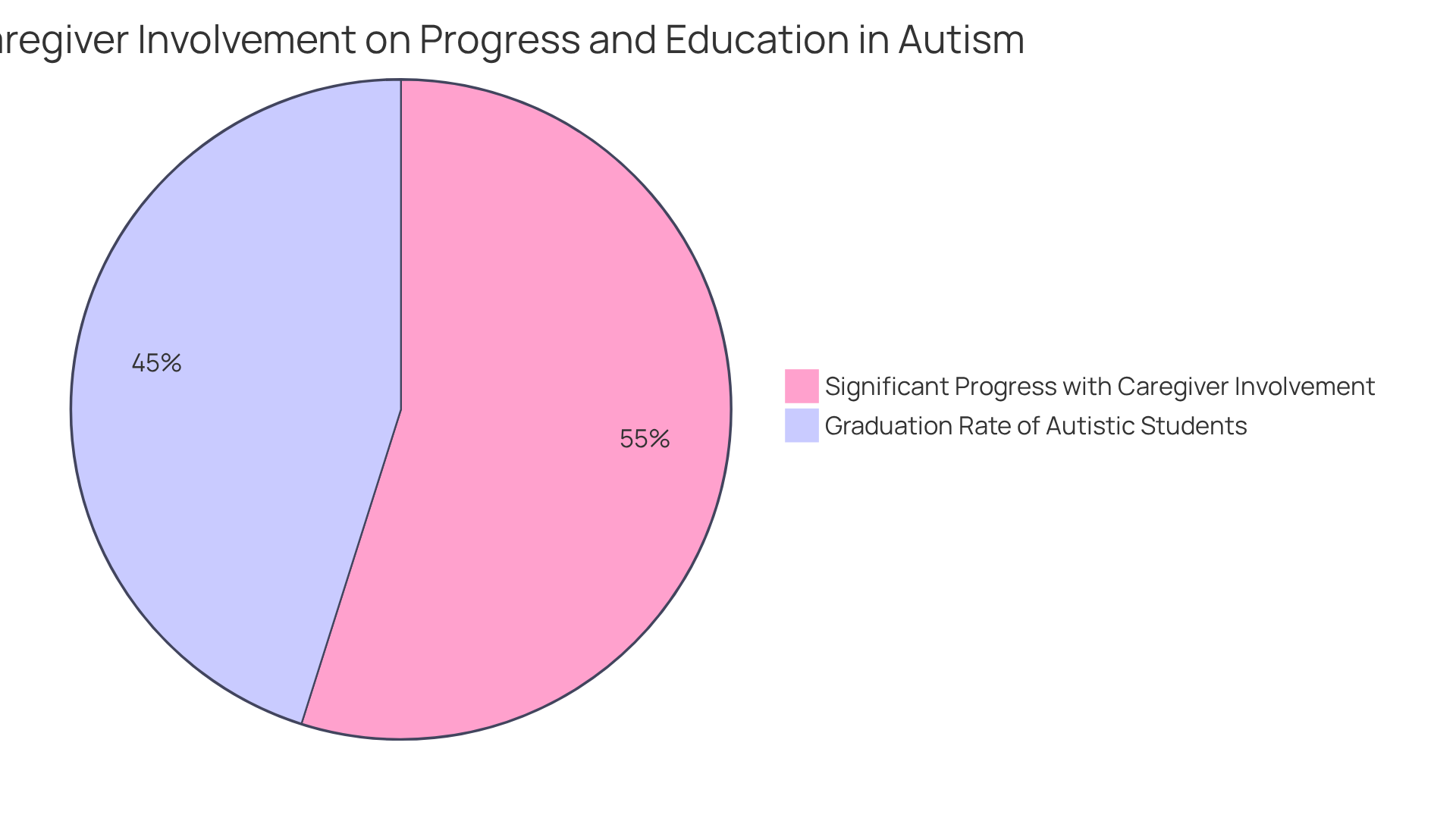
To enhance the effectiveness of expense strategies in ABA therapy, practitioners must engage in and make necessary adjustments. This systematic process involves tracking information on target behaviors to evaluate the impact of consequences on behavior modification. Notably, studies indicate that when individuals do not exhibit favorable reactions to interventions, therapists must be ready to adapt their approaches. This may involve:
Ongoing assessment and modification are crucial for achieving successful outcomes in ABA therapy, as evidenced by case studies that demonstrate improved effectiveness through tailored adjustments based on individual conduct patterns.
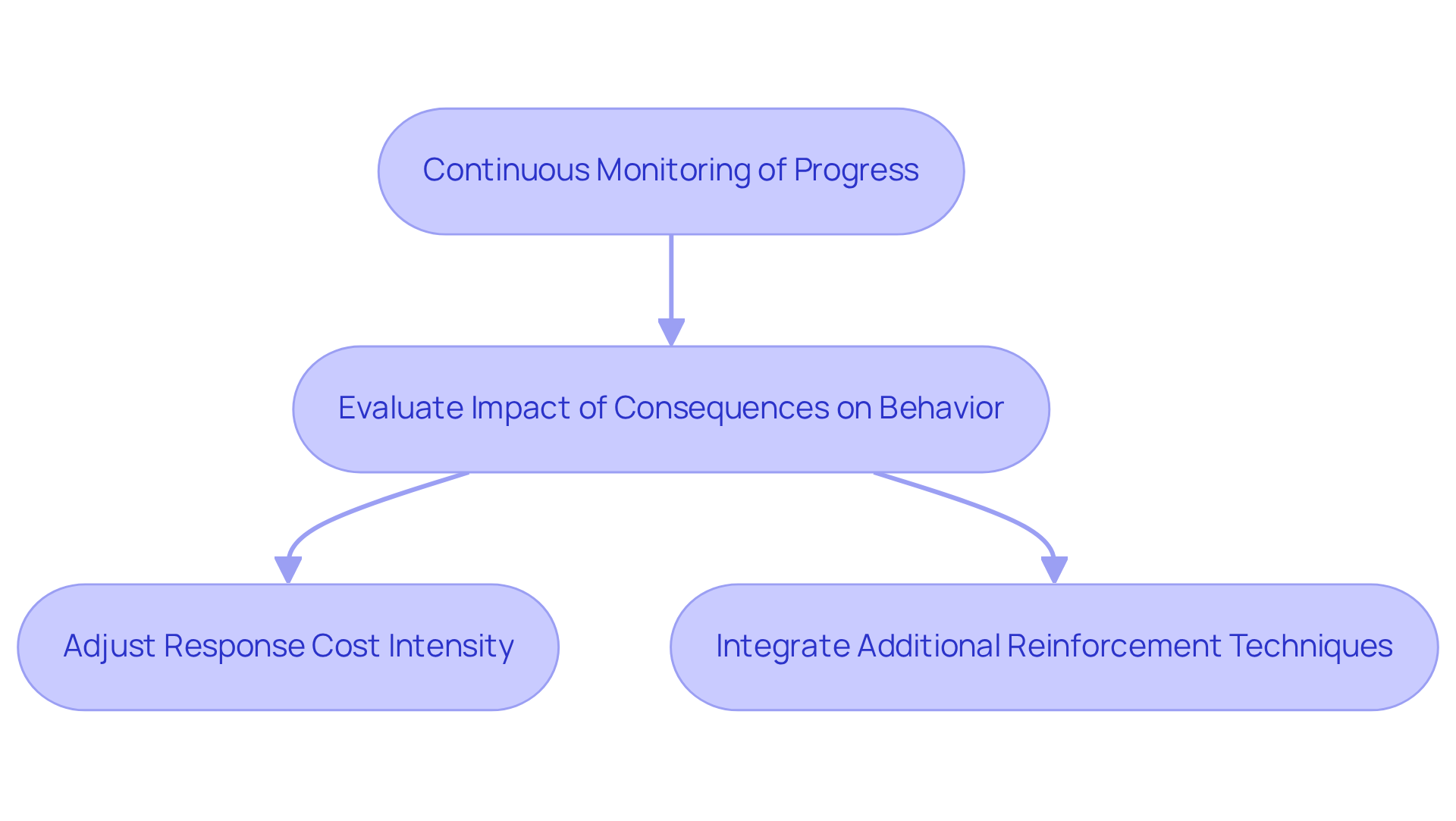
Response cost ABA is a versatile strategy that can be effectively implemented in various real-world scenarios within ABA therapy. In classroom environments, for instance, educators frequently employ token economies, where students earn tokens for demonstrating positive actions and lose them for disruptive conduct. Research indicates that this approach can lead to significant improvements in classroom behavior, with studies showing an 87% reduction in disruptive actions when penalty techniques are utilized consistently. It is essential to recognize that removal expenses represent a form of negative punishment, aimed at decreasing unwanted actions by taking away valued reinforcers.
In home settings, parents can apply similar tactics by revoking privileges, such as screen time, when a child displays undesirable behavior. This strategy not only fosters accountability but also reinforces the associated with actions. For example, a case study highlighted the effective implementation of consequence management in a domestic environment, where parents observed improved compliance and fewer outbursts after establishing clear rules for behaviors and repercussions. Ethical considerations are paramount in this context, as maintaining the dignity of individuals and preventing emotional distress are critical issues in ABA therapy.
These practical applications demonstrate how response cost ABA can be seamlessly integrated into daily scenarios, promoting positive changes and enhancing the overall effectiveness of ABA therapy. Collaboration between ABA therapists and caregivers is vital for the successful implementation of fee reduction strategies, ensuring that interventions are tailored to meet the specific needs of each individual.
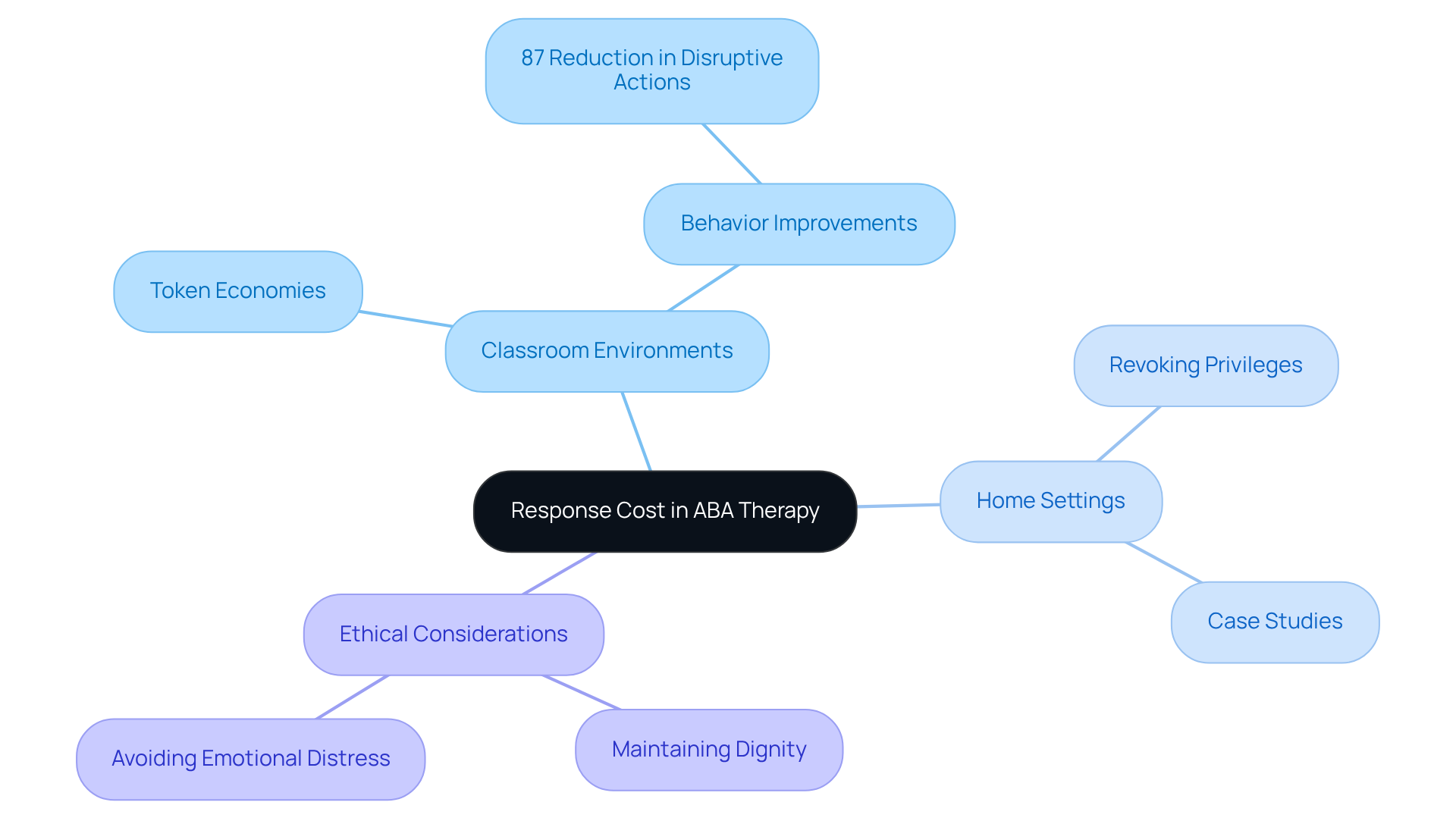
In summary, the expense of intervention stands as a significant behavioral modification technique within ABA therapy, effectively reducing unwanted actions when applied with precision.
It is crucial to recognize the importance of:
Additionally, overseeing and modifying [response cost ABA strategies](https://hireaba.today) is essential to guarantee their efficacy.
By comprehensively understanding the mechanisms, benefits, and challenges associated with response cost ABA, practitioners can refine their therapeutic approaches and foster positive behavior change in individuals.
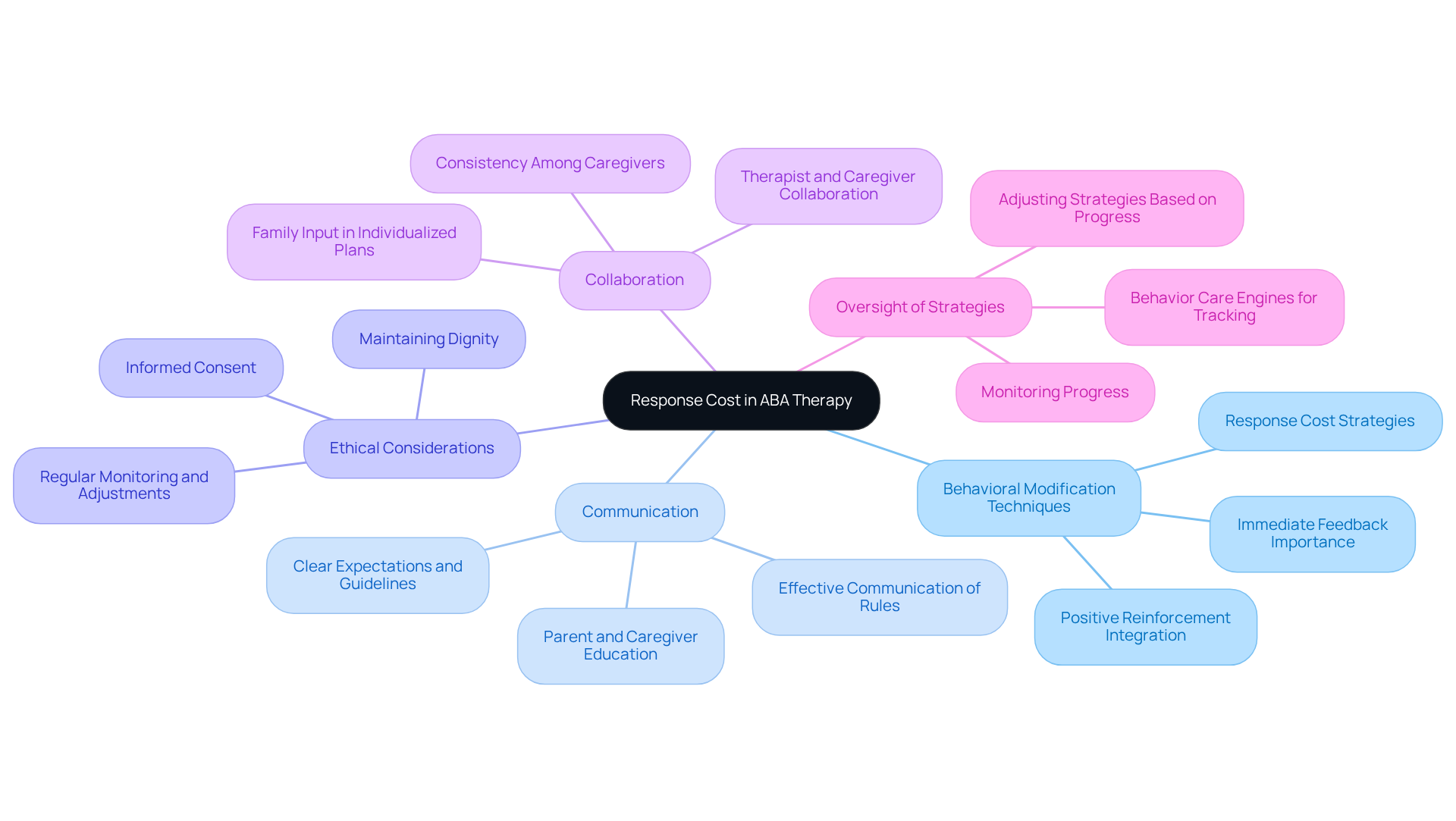
Understanding and implementing response cost in ABA therapy is essential for effective behavior modification. This behavioral intervention, which involves the removal of valued items or privileges as a consequence for unwanted actions, serves as a powerful tool for fostering accountability and promoting positive behavioral changes. The insights shared throughout the article underscore the significance of ethical considerations, clear communication, and collaboration among therapists and caregivers, all of which are vital for the successful application of response cost strategies.
Key points highlighted include:
The necessity for continuous monitoring and adapting strategies to individual needs is emphasized, ensuring that interventions remain effective while safeguarding emotional well-being. Moreover, real-world applications demonstrate how response cost can be integrated into everyday scenarios, illustrating its versatility and effectiveness in various settings.
To maximize the impact of response cost in ABA therapy, practitioners are encouraged to adopt a holistic approach that balances effectiveness with ethical responsibility. By fostering strong partnerships with caregivers and continuously refining their strategies, therapists can create a supportive environment that not only addresses behavioral challenges but also promotes overall development and success for individuals in therapy. Embracing these insights will lead to more effective and compassionate practices in the ever-evolving landscape of ABA therapy.
What is Hire ABA and its purpose?
Hire ABA is a recruitment platform designed to connect Board Certified Behavior Analysts (BCBAs) with job opportunities in the field of Applied Behavior Analysis (ABA) therapy. It aims to streamline the hiring process and help qualified professionals find roles that align with their expertise and career aspirations.
How has the demand for BCBAs changed in recent years?
The demand for BCBAs has significantly increased, with a 1,942% rise from 2010 to 2018. This trend is expected to continue, with a projected 25% increase in demand by 2026.
What services does Hire ABA offer to job seekers?
Hire ABA offers personalized resume assessments, advanced job fit scoring, and support in identifying job opportunities that match candidates' skills, preferences, and desired locations, enhancing their chances of securing desirable positions.
What is response cost in ABA therapy?
Response cost is a behavioral intervention strategy in ABA therapy that involves removing a valued item or privilege as a consequence for unwanted actions, aiming to reduce the frequency of undesirable behaviors through negative outcomes.
How does response cost work in practice?
Response cost works by removing a previously obtained reinforcer when an unwanted action occurs. For example, if a child throws toys, a therapist might take away a preferred toy, helping the individual understand the connection between their behavior and the loss of a valued item.
What are the key components for successful implementation of response cost?
Successful implementation requires clear communication of expectations, consistent enforcement of repercussions, and regular monitoring of progress to ensure the intervention meets its intended objectives.
What ethical considerations should be taken into account when using response cost?
Therapists must consider the potential emotional effects on individuals, as losing a reinforcer can lead to frustration or resentment. It is important to tailor strategies to individual sensitivities and monitor for negative effects to maintain a compassionate therapeutic relationship.
Our expert recruitment strategies and AI-driven sourcing ensure that you receive top-notch candidates quickly, without compromising on quality. Whether you’re looking for BCBAs, Clinical Directors, or RBTs, we’ve got you covered.